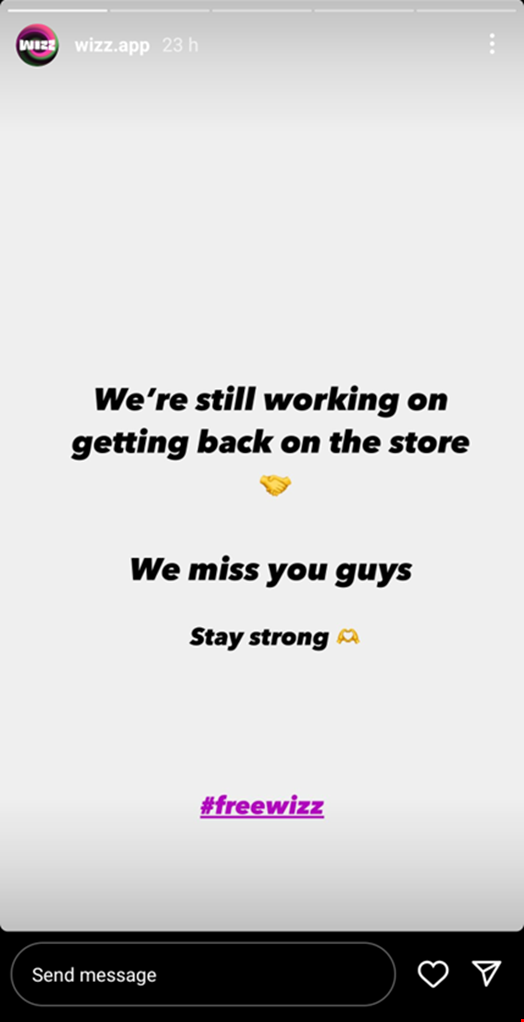Wizz, a growing social media app among US teenagers, was removed from the Apple App Store and the Google Play Store on January 30.
Apple and Google had been contacted by the National Center on Sexual Exploitation, a US conservative anti-pornography organization, who thanked the two giants on X “for booting the Wizz app from their app stores after our outreach to them.”
Wizz is a Tinder-like app for teenagers (aged 13+) owned by Voodoo, a French mobile video game developer.
Voodoo markets Wizz as a safe space for teenagers. The Wizz website provides a Q&A section called “Is Wizz Safe?”, where the company details how it prevents fake profiles and offensive content.
Nevertheless, Wizz was mentioned in a recent report by the Network Contagion Research Institute (NCRI) as one of the top platforms used by cybercriminals in a new surge of financial sextortion attacks targeting children and teenagers in Australia, Canada and the US.
Specifically, the NCRI report indicated that Wizz was the third most used app for sextortion purposes after Instagram and Snapchat.
It also said that the dating app was where sextortion schemes were fastest-rising.
“In the Google Play Store and the App Store, dozens of minors have reported that they were coerced into producing self-generated child sexual exploitation material (SG-CSEM) and blackmailed on Wizz – alongside other child safety concerns, including a high frequency of complaints that the app is serving pornographic ads to minors,” the NCRI researchers observed.
Wizz Is Working with Apple and Google
On its Instagram account, Wizz said the app was “taking a break from the app stores due to a technical hiccup” and started using the hashtag #freewizz.

Speaking to Infosecurity, a spokesperson for Wizz owner Voodoo said, "Apple and Google are seeking more information on our app, and we are working closely with their teams to clarify our platform's extensive safeguards for users. We hope to resolve this matter soon."
Apple and Google have confirmed they are collaborating with Wizz.
When asked about the NCRI report, the spokesperson added that the company has implemented strict security controls to avoid abusive or illegal behavior on its platform.
"We have zero tolerance for scams and inappropriate behavior of any kind on the platform, and we are constantly innovating to ensure Wizz is leading the industry on user safety. We've developed a comprehensive safety ecosystem, where all written and visual content is moderated, age verification is required, and where user-reported situations are immediately addressed.”
Wizz CTO Counters NCRI Report Claims
On January 1, Gautier Gédoux, Wizz co-founder and CTO, published a post on the Medium platform to address some of the claims made in the NCRI report.
“We are not aware of any successful extortion attempts that occurred while communicating on the Wizz app,” Gédoux started.
Regarding the NCRI claim that young Wizz users were forced to produce self-generated child sexual exploitation material and were blackmailed, Gédoux noted that the footnote link associated with the statement directing to the Google Play Store’s entry showed “no blackmail claims made in the comments.”
“On the Apple Store reviews, there are two blackmail claims, but again, those situations happened when the review author moved to another messaging platform like Snapchat or Instagram,” he added.
Gédoux also dismissed the polls cited by the NCRI for not using a representative audience of Wizz users.
“Reddit polls are subject to self-selection bias, meaning that only those who choose to participate will have their opinions reflected,” he said.
The Wizz CTO also insisted that the app was proactive in detecting and removing potential scam attempts.
He stated that the app bans about 4000 users daily, which amounts to nearly 2% of all individuals trying to access the platform. He added that Wizz is one of the few apps using Apple Device Check SDK technology.
Gédoux also explained how the app is trying to fight against users sending pornographic ads.
“Advertising on Wizz is done through AppLovin Max and Unity, the major players used by almost all mobile applications in the industry. On these ad networks, all illegal, hateful, violent, sexual, political, or otherwise inappropriate advertisements are blocked from being published within the Wizz.
“In the past, Wizz has encountered some issues with suggestive images from these networks, but not pornography. In addition to the measures above, Wizz has recently implemented a secondary layer of moderation whereby any inappropriate ads that are not correctly flagged and blocked by these providers go through a secondary screening through our service provider GeoEdge.”
Wizz has been allowed back on the Apple App Store after conducting a thorough review of Wizz’s safeguards and technology.
The company issued a press release on February 13, in which it announced additional safeguards to the Wizz app that further strengthen its existing safety ecosystem.
This article was updated with a statement from Wizz owner Voodoo on February 14, 2024.
